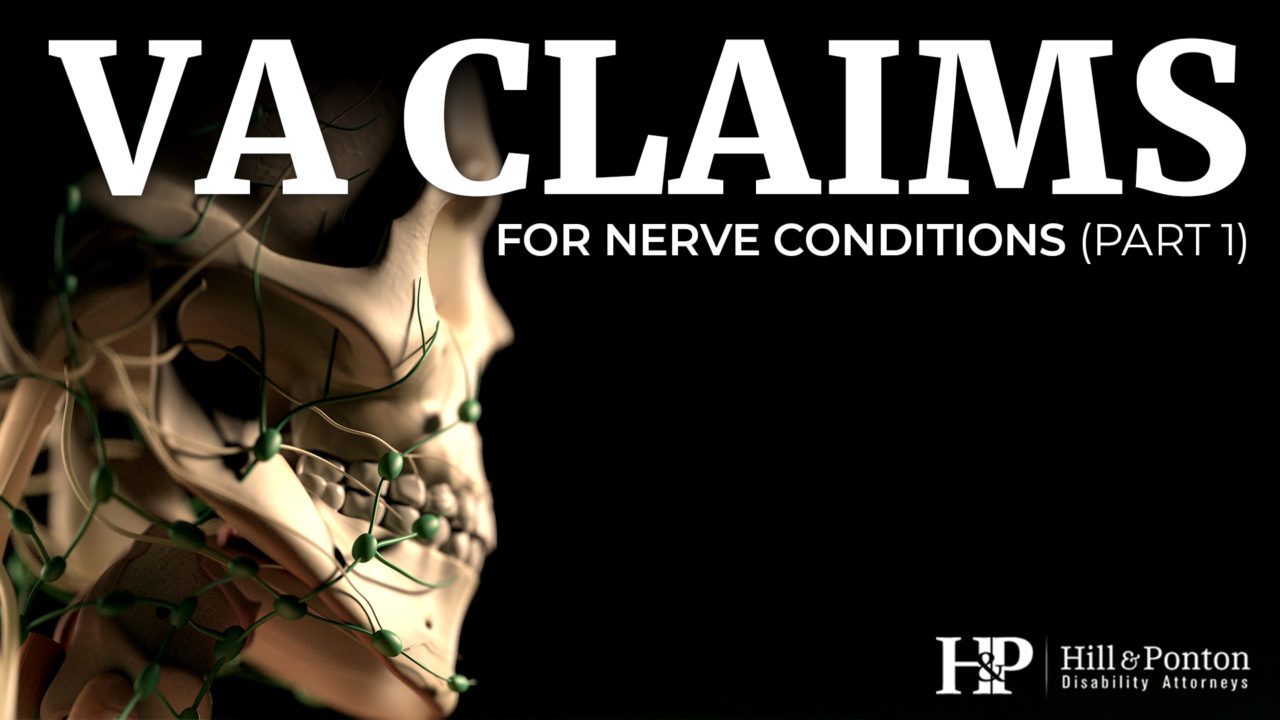There are three categories that a nerve condition can be rated under:
- Paralysis of the nerve – The nerve cannot function at all
- Neuritis of the nerve – The nerve can still function, but it is swollen, irritated, and very painful. Neuritis of the nerve involves at least one of the following; 1) a decreased ability to sense, 2) muscle atrophy, and/or 3) loss of reflexes.
- Neuralgia of the nerve – The nerve causes occasional or constant pain. Additional symptoms may include tingling and numbness.
How Are Nerve Conditions Rated by VA?
When rating a nerve condition, the above three categories are broken down further:
- Paralysis of the nerve is broken down into:
- Complete paralysis – The nerve is completely paralyzed AND the affected body part cannot function at all.
- Incomplete (severe) paralysis – The nerve is not completely paralyzed, and there are symptoms such as poor blood circulation and muscle atrophy which seriously limit the body part’s ability to function.
- Incomplete (moderate) paralysis – The nerve is not completely paralyzed, and there are symptoms such as tingling, numbness, and moderate pain which significantly affect the body part’s ability to fully function.
- Incomplete (mild) paralysis – The nerve is not completely paralyzed, and the only symptoms present are tingling or mild pain.
- Neuritis of the nerve is broken down into:
- Severe – All three symptoms (loss of sensation, muscle atrophy, and loss of reflexes) are present, and seriously limit the affected body part’s ability to function.
- Moderate – One or more of the main symptoms are present and they definitely and significantly interfere with the affected body part’s ability to function.
- Mild – One or more of the main symptoms are present, but are only mild and do not significantly interfere with the affected body part’s ability to function.
- Neuralgia is broken down into:
- Moderate – Symptoms such as tingling, numbness, and moderate to severe pain which definitely and significantly interfere with the affected body part’s ability to function.
- Mild – Symptoms such as tingling or mild pain. There may also be slight or mild limitations involving the movement of the affected body part, but the limitations do not really affect the body part’s overall functioning.
Are Nerve Condition Ratings Affected by the Specific Nerve?
All nerve conditions are rated according to the above categories, but the ultimate rating assigned to a nerve condition depends on the actual nerve affected. If a veteran has radiculopathy affecting the sciatic nerve, the VA will decide which category best approximates the symptoms the veteran is experiencing, and then will look at the rating criteria associated with that category for the sciatic nerve.
So, when rating a nerve condition, the VA looks at three things: 1) the VA first decides whether the condition should be rated under paralysis, neuritis, or neuralgia; 2) the VA will decide the corresponding level of severity; and 3) the VA looks at the actual nerve affected. For example, let’s say a veteran has radiculopathy in his lower back. Specifically, the veteran’s radiculopathy affects the veteran’s sciatic nerve. The veteran has constant, severe pain in his lower back because of the radiculopathy affecting his ability to function on a daily basis. First, the VA will rate the veteran’s condition under the neuralgia category. Next, because of the constant and severe pain which significantly interferes with the veteran’s ability to function, the condition should be rated as moderate. Last, the VA will look at the rating criteria for neuralgia associated with the sciatic nerve (diagnostic code 8720) and assign a 20% rating based on moderate neuralgia of the sciatic nerve.
What if you have limited motion and a separate nerve condition?
As you can see, ratings for nerve conditions are based on the loss of function of the certain body part affected. This becomes especially important when looking at the paralysis ratings. Just because the nerve itself is completely paralyzed, does not mean the condition will be rated as completely paralyzed. In order for the condition to be rated as completely paralyzed, the body part affected by the nerve condition must be paralyzed. So, if a nerve in the shoulder is completely paralyzed, but the shoulder can still move, then it would be rated under one of the incomplete paralysis criteria. However, if the shoulder can no longer move the arm or function at all, THEN the nerve condition will be rated under paralysis.
A nerve condition can be rated under paralysis, neuritis, or neuralgia, or it can be rated according to limited motion caused by the condition, whichever results in the higher rating. If the limited motion is a result of the nerve condition, you cannot receive a rating under one of the three nerve categories AND under limited motion; you can only receive one rating. On the other hand, if the limited motion is NOT caused by the nerve condition, you can receive two separate ratings; one for the nerve condition, and one for the limited motion.
Lastly, when checking to see whether you’ve received the correct rating for your nerve condition, be sure to check and see if the VA remembered to apply the bilateral factor. If your nerve condition affects both sides of the body, you should receive a separate rating for each side affected along with receiving the additional bilateral factor. For example, if your nerve condition affects both the left leg and the right leg, you should have a rating for each leg, and the bilateral factor should be applied to your overall combined rating. For more information on the bilateral factor, click here.





